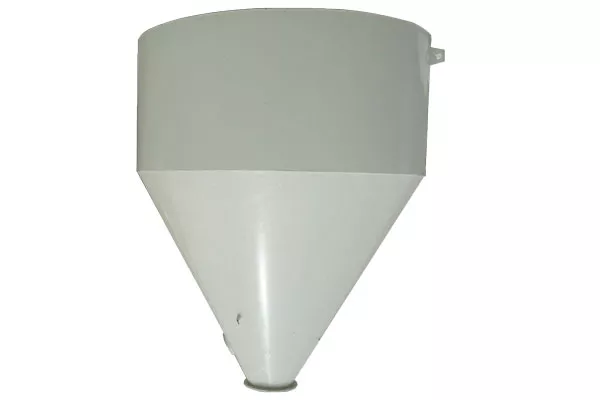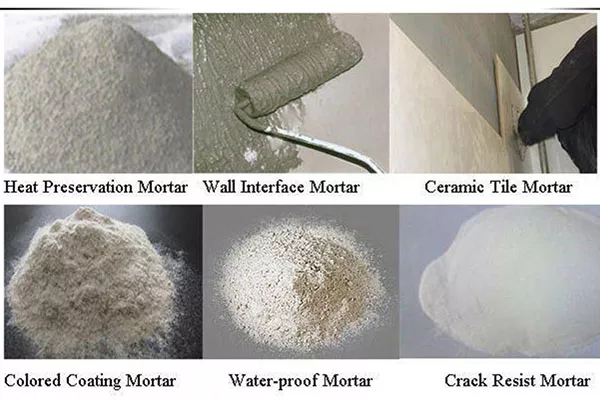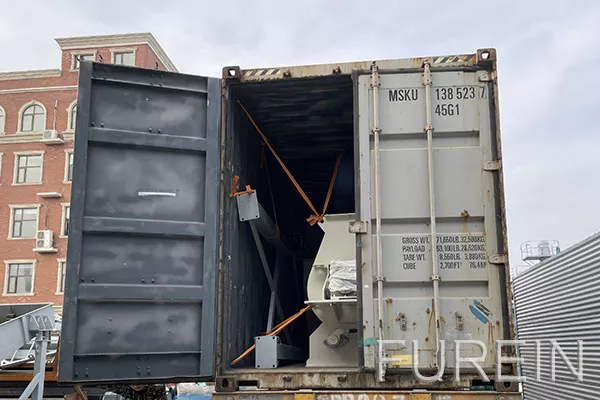The types of dry mix mortar are mainly divided into ordinary mortar and special mortar.
Standard ordinary mortar includes masonry, plastering, ground, etc.
Special mortar includes ceramic tile adhesive, dry powder interface agent, external heat preservation mortar, self-leveling mortar, waterproof mortar, repair mortar, inside and outside wall putty, seam filling agent, grouting material, etc.

Classification of dry mix mortar
Ordinary dry mix mortar
Ordinary dry powder mortar can be divided into three types:
- Masonry mortar is mainly used in masonry projects.
- Plastering mortar is mainly used for plastering works.
- Ground mortar is primarily used for the surface layer or leveling layer of building ground and roof.
Masonry mortar
The masonry mortars are sand, lime (or cement), and water. The proportions of these ingredients will vary according to the strength needed in each mortar mix. For example, a mortar used for building brick walls will have different ratios than one used for laying stone flooring.
It is made by mixing water, sand, and cement, which forms a paste that can be applied to the surface of a brick or stone wall and then set hard by drying.
Masonry mortar that contains more sand than cement can be wetted with water periodically during construction to keep it working until it cures into rock-hard solidity after several days or weeks of healing time in an outdoor environment (depending on local humidity levels).
Maybe you are interested in How To Produce Masonry Mortar?
Plastering mortar
Plastering mortar is a plastering dry powder made of high-quality cement, fine aggregate, and a variety of high-performance admixtures and used in construction engineering plastering building materials. It is widely used in the decoration industry to fill the gap between the wall surface and the plate or tile and fill the gap between the wall surface and the wooden door frame, window frame, etc. Plastering mortar also has good compatibility with gypsum board and other gypsum board products, which can be directly mixed with gypsum board mortar in one step to form a solid surface bonding layer.
Ground mortar
Ground mortar is the most common type of mortar. It consists of powdered lime and sand, which are combined with water to form a paste that can be used as mortar. Ground mortar can also be called cement mortar or lime putty. Ground mortar can also be called cement mortar. It can be used for leveling and smoothing a surface before applying another material, such as paint or plaster.
Ground mortar is a mixture of cement, sand, and water. It’s used to fill in gaps between bricks or stones in a wall or chimney.
Special dry mix mortar
Special dry mix mortar refers to a thin layer of dry powder mortar, decorative dry powder mortar, or dry powder mortar with unique functions such as crack resistance, high adhesion, waterproof, and impermeability and decoration. Mainly include inorganic thermal insulation mortar, anti-cracking mortar, plastering mortar, wall tile adhesive, interface agent, caulking agent, color finishing mortar, grouting material, grouting agent, waterproof mortar, etc.
Tile adhesive mortar is a cement-based adhesive material for pasting ceramic tiles. It bonds the tile to the substrate and provides a waterproof barrier between the two surfaces.
Tile adhesive is a cement-based adhesive material for pasting ceramic tiles. It is used to lay tiles on walls, floors, countertops, and backsplashes. Tile adhesive mortar is used to attach the grout between tiles in a mosaic. When applying floor tile, you will likely need to install a backer board (or subfloor) before installing your tile. Tile adhesive mortar acts like glue between the backer board and the tile itself. You may also need an adhesive for installing tile on countertops or backsplashes if you have a smooth surface rather than one with texture or grooves.
Interface mortar
Interface mortar, also known as interface treatment agent, is a material with a two-way affinity that can firmly bond to the base layer and be firmly connected by the new adhesive on the surface. Different surface properties of materials, such as porous, highly absorbent materials, relatively smooth low absorbent materials, non-porous, non-absorbent materials, and adhesive failure due to the cohesive force generated by the shrinkage and expansion of the subsequent cladding materials of the substrate, etc. Both require interfacial treatment agents to enhance the bond between the two materials. In a physical sense, the interface treatment agent is essentially a construction adhesive with bidirectional affinity.
Self-leveling mortar is a mixture of cement, sand, and water that will level itself as it dries. It is used on uneven substrates to provide a suitable, flat, smooth, and firm bedding substrate to erect a variety of floor materials, including tile, stone, or marble. The mortar is also used to fill gaps between tiles or stones during installation. Self-leveling mortars are available in dry and wet mixes. The dry mortar must be mixed with water before use. Wet mixtures can be applied directly from the container.
Waterproof mortar
Waterproof mortar is a cement-based material mainly composed of cement and filler. It is a dry-mixed mortar mixed with polymers, additives, admixtures, or special adhesives.
Repair mortar
The repair mortar is formulated from cement, screening stone, high-quality filler, and synthetic polymer. It can ensure the early strength of mortar and other essential properties required for repairing concrete. Repair mortar is part of the concrete repair system and is used to improve and restore roads, bridges, parking lots, tunnels, etc.
Putty mortar
Putty mortar is a thin layer of leveling mortar used to fill in the gaps between tile, stone, and other materials on the wall. It also acts as a bonding agent to help hold the individual pieces together.
Putty mortar fills joints between tiles, stones, or bricks. This mortar type contains cement, white sand, and other fine particles that make it easier to work with than regular brick mortar. It sets up quickly but does not harden as soon as ordinary brick mortar does. This means that you do not have to wait for it to dry before installing your next course of tiles or bricks.
How to make dry mix mortar in mass?
If you want to mass produce any of the above mortars, you can use the dry mix mortar production line, this production line only needs 3-4 workers and can produce 80 tons of mortar per day. We supply dry mix mortar plant has 15 years of experience in this industry, if you want to start a dry mortar business, we can help you.



